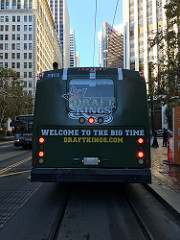Photo courtesy of Ian Kennedy on Flickr.com
So you’re telling me I can bet legally without getting in trouble? Well, in certain states (until further notice) yes, but with no guarantees…
If you’ve watched any sports event over the last seven months, I guarantee you that you have seen at least three advertisements for both FanDuel and DraftKings. Both websites are classified as “Daily Fantasy Sports”, or DFS for short; where anyone can win money by playing fantasy sports. Recently though, states have gone toe-to-toe against these companies to argue that they are not fantasy sports, but rather they are gambling and betting sites (both of which are illegal ).
The main issue of the legality is this: Can these companies prove that there is some sort of skill involved, or is it all luck for winning? If it is all luck, than these companies will be ruled illegal because it will be considered gambling, an industry that is legal if regulated by gaming commissions. If some skill is involved, then the companies are legal to operate with no regulatory commission overseeing them. That’s the difference in millions of revenue, and profit.
It is up to individual states to decide on the legalities of such companies and bring them to court. New York and Nevada (ironically: the home of Las Vegas) have both outlawed the sites all together. States like Massachusetts, however, are attempting to regulate them because their revenues can be profitable for the state. Since each company is a multi-billion dollar venture, one can easily see why states want a piece of the pie.
Massachusetts is the leading state that is pushing for regulations. They propose that there be an age restriction (No one under 21), and outlaw DFS attached to college athletics. Since NCAA athletes are not “pay for play,” betting on them is extremely frowned upon.
The only place where the government will turn a blind eye is the NCAA Men’s Basketball tournament. Why? Because everyone makes a bracket, and everyone bets on it. The government cannot regulate you and your college friends from making a bracket where the winning pool is a couple hundred of dollars and a bottle of liquor. There is simply no way the Federal Government can regulate this event.
Colligate athletes are even outlawed under a new NCAA rule to play DFS games. Since they are on scholarship, they are not allowed to take any benefits (see Reggie Bush, Terrelle Pryor) and money sites like these are a slap in the face to the always-questionable National Colligate Athletic Association.
A major obstacle for these companies came up in the fall, when there were allegations of insider trading done on the sites where employees gained an unfair advantage by working for the sites. Some knew how to manipulate the system and win up to $350,000 . Consequently, employees of each company have been banned from playing DFS games.
You’ve seen the commercials, you’ve seen people winning, you’ve seen your classmate playing them on their phone in the middle of your lecture, and guess what: politicians have also seen this. I believe that these companies will be legal to operate but with gaming oversight. They are a rare mix of betting (illegal) and fantasy sports (legal). Over the next few months, you won’t be seeing as many commercials on TV (ESPN has refused to air DFS ads) but you will see these companies in legal news outlets.
Maybe the onslaught of commercials saying: “Come win thousands on betting on sports without getting caught by the Government!” wasn’t the best way to advertise, but only time will tell how these companies will move forward.












































































































Jake DeFonzo • Jan 26, 2016 at 12:39 pm
I think this business is actually gonna get bigger and bigger. State legislature will want that piece of the pie, so I think it will be loosely regulated in the near future.